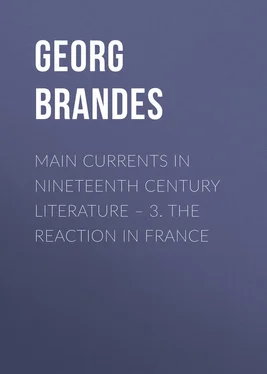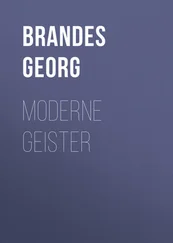Georg Brandes - Main Currents in Nineteenth Century Literature – 3. The Reaction in France
Здесь есть возможность читать онлайн «Georg Brandes - Main Currents in Nineteenth Century Literature – 3. The Reaction in France» — ознакомительный отрывок электронной книги совершенно бесплатно, а после прочтения отрывка купить полную версию. В некоторых случаях можно слушать аудио, скачать через торрент в формате fb2 и присутствует краткое содержание. Жанр: foreign_antique, foreign_prose, на английском языке. Описание произведения, (предисловие) а так же отзывы посетителей доступны на портале библиотеки ЛибКат.
- Название:Main Currents in Nineteenth Century Literature – 3. The Reaction in France
- Автор:
- Жанр:
- Год:неизвестен
- ISBN:нет данных
- Рейтинг книги:4 / 5. Голосов: 1
-
Избранное:Добавить в избранное
- Отзывы:
-
Ваша оценка:
- 80
- 1
- 2
- 3
- 4
- 5
Main Currents in Nineteenth Century Literature – 3. The Reaction in France: краткое содержание, описание и аннотация
Предлагаем к чтению аннотацию, описание, краткое содержание или предисловие (зависит от того, что написал сам автор книги «Main Currents in Nineteenth Century Literature – 3. The Reaction in France»). Если вы не нашли необходимую информацию о книге — напишите в комментариях, мы постараемся отыскать её.
Main Currents in Nineteenth Century Literature – 3. The Reaction in France — читать онлайн ознакомительный отрывок
Ниже представлен текст книги, разбитый по страницам. Система сохранения места последней прочитанной страницы, позволяет с удобством читать онлайн бесплатно книгу «Main Currents in Nineteenth Century Literature – 3. The Reaction in France», без необходимости каждый раз заново искать на чём Вы остановились. Поставьте закладку, и сможете в любой момент перейти на страницу, на которой закончили чтение.
Интервал:
Закладка:
Return to perfection is, in art, a return to the lawlessness of genius, to the stage at which the artist may do one thing, or may do another which is exactly the opposite. In life it is the retrogression of idleness, for he who is idle goes back, back to passive pleasure. In philosophy it is the return to intuitive beliefs, beliefs to which Schlegel applies the name of religion; which religion in its turn leads back to Catholicism. As far as nature and history are concerned, it is retrogression towards the conditions of the primeval Paradise. 15 15 A. Ruge: Gesammelte Schriften , i. 328, &c.
Thus it is the central idea of Romanticism itself – retrogression – which explains how it was that even the heaven-storming Lucinde , like all the other heaven-stormers of the Romanticists, had not the slightest practical outcome.
VI
ROMANTIC PURPOSELESSNESS
In Lucinde , then, as in a nutshell, are to be found all the theories which, later in the history of Romanticism, are developed and illustrated by examples. In such an essay as that on the Instinct of Change by the Æsthete in Kierkegaard's Enten-Eller ("Either-Or") idleness is systematised. "Never adopt any calling or profession. By so doing a man becomes simply one of the mob, a tiny bolt in the great machinery of the state; he ceases to be master… But though we hold aloof from all regular callings, we ought not to be inactive, but to attach great importance to occupation which is identical with idleness… The whole secret lies in the independence, the absence of restraint. We are apt to believe that there is no art in acting unrestrained by any law; in reality the most careful calculation is required, if we are not to go astray, but to obtain enjoyment from it…"
Idleness, lawlessness, enjoyment! This is the threeleaved clover which grows all over the Romanticist's field. In such a book as Eichendorff's Das Leben eines Taugenichts ("Life of a Ne'er-do-Well") idleness is idealised and exalted in the person of the hero. And purposelessness is another important item, which must on no account be overlooked. It is another designation for the genius of Romanticism. "To have a purpose, to act according to that purpose, artificially to combine purpose with purpose, and thereby create new purposes, is a bad habit, which has become so deeply rooted in the foolish nature of godlike man, that he is obliged, when for once it is his desire to float aimlessly upon the stream of constantly changing images and emotions, to do even this of settled purpose… It is very certain, my friend, that man is by nature a serious animal." (Julius to Lucinde.)
On the subject of this utterance, even that orthodox Christian, Kierkegaard, says: "In order not to misjudge Schlegel, we must bear in mind the perverted ideas which had insinuated themselves into men's minds in regard to many of the relations of life, and which had specially and indefatigably striven to make love as tame, well broken-in, heavy, sluggish, useful, and obedient, as any other domestic animal – in short, as unerotic as possible… There is a very narrow-minded morality, a policy of expediency, a futile teleology, which many men worship as an idol, an idol that claims every infinite aspiration as its legitimate offering. Love is considered nothing in itself; it only acquires importance from the purpose it is made to serve in the paltry play which holds the stage of family life." It is perhaps admissible to conclude that what Kierkegaard says about "the tame, well broken-in, sluggish, and useful domestic animal, love," found its most apt application in Germany, which at that time was undoubtedly the home of the old-fashioned womanliness. The satirical sallies in Tieck's comedies occasionally point in the same direction. In his Däumling ("Hop-o'-my-thumb") a husband complains of his wife's craze for knitting, which gives him no peace; a complaint which, perhaps, can only be understood in Germany, where to this day ladies are to be seen knitting even in places of public entertainment – at the concerts on the Brühlsche Terrasse in Dresden, for example. Herr Semmelziege says: —
"Des Hauses Sorge nahm zu sehr den Sinn ihr ein,
Die Sauberkeit, das Porzellan, die Wäsche gar:
Wenn ich ihr wohl von meiner ew'gen Liebe sprach,
Nahm sie der Bürste vielbehaartes Brett zur Hand,
Um meinem Rock die Fäden abzukehren still.
Doch hätt' ich gern geduldet Alles, ausser Eins:
Dass, we sie stand, und we sie ging, auswärts, im Haus,
Auch im Concert, wenn Tongewirr die Schöpfung schuf,
Da zaspelnd, haspelnd, heftig rauschend, nimmer still,
Ellnbogen fliegend, schlagend Seiten und Geripp,
Sie immerdar den Strickstrumpf eifrig handgehabt." 16 16 "Her mind was occupied with household cares — The washing, and the china, and the cook: Did I begin to speak of endless love, She took the bristled clothes-brush in her hand, And calmly turned me round and brushed my coat. All this I bore quite placidly, but not That, sitting, standing, everywhere we went, Yes, even at concerts, when sweet strains beguiled, Entwining, clicking, rustling, never still, Her elbows flying, thumping on her side, Her knitting-needles vigorously she plied." "The sacred hymeneal couch had received us; Luna's chaste beams illumined our chamber. Encircled by white arms I lay, praying for Aphrodite's favour, dreaming of the marvellous child that needs must be the offspring of a night like this, the mighty hero who in fulness of time shall see the light. Soft taps upon my shoulder rouse me from my dream; 'tis my sweet bride caressing me; I thank her silently, with tender, meaning smile. One moment later, and my heart is torn by hellish pangs of disillusionment; it is her knitting that is dancing on my back; worse still – she is at the turning of the heel, that point when the most skilful, despite their counting, often blunder."
The most comical part of this satire is the passage which, whether intentionally or unintentionally on the author's part, reads like a parody of the well-known Roman Elegy in which Goethe drums the hexameter measure, "leise mit fingernder Hand," upon his mistress's back: —
"Einst als des Thorns heilig Lager uns umfing,
Am Himmel glanzvoll prangte Lunas keuscher Schein,
Der goldnen Aphrodite Gab' erwünschend mir,
Von silberweissen Armen ich umflochten lag.
Schon denkend, welch ein Wunderkind so holder Nacht,
Welch Vaterlandserretter, kraftgepanzert, soll
Dem zarten Leib entspriessen nach der Horen Tanz,
Fühl' ich am Rücken hinter mir gar sanften Schlag:
Da wähn ich, Liebsgekose neckt die Schulter mir,
Und lächle fromm die süsse Braut und sinnig an:
Bald naht mir der Enttäuschung grauser Höllenschmerz
Das Strickzeug tanzt auf meinem Rücken thätig fort;
Ja, stand das Werk just in der Ferse Beugung, wo
Der Kundigste, ob vielem Zählen, selber pfuscht."
When the cult of the useful is carried as far as this, we can understand advocacy of purposelessness.
But purposelessness and idleness are inseparable. "Only Italians," we are told, "know how to walk, and only Orientals how to lie; and where has the mind developed with more refinement and sweetness than in India? And in every clime it is idleness which distinguishes the noble from the simple, and which is, therefore, the essence of nobility."
This last assertion is outrageous, but its very audacity is significant. It shows the attitude of Romanticism towards the masses. To have the means to do nothing is, in its estimation, the true patent of nobility. Its heroes are those who cultivate the unremunerative arts, and are supported by others – kings and knights like those in Fouqué's and Ingemann's books, artists and poets like those in Tieck's and Novalis's. It separates itself from humanity, will do nothing for it, but only for the favoured few. The hero and heroine in Lucinde are the gifted artist and the woman of genius; it is not the ordinary union, but the "nature-marriage" or the "art-marriage" ( Naturehe, Kunstehe ) for which our interest is claimed. Observe how Julius at once asks Lucinde whether her child, if a girl, shall be trained as a portrait or as a landscape painter. Only as a member of the fraternity of artists do her parents take any interest in her. Only authors and artists have part and lot in the poetry of life.
Читать дальшеИнтервал:
Закладка:
Похожие книги на «Main Currents in Nineteenth Century Literature – 3. The Reaction in France»
Представляем Вашему вниманию похожие книги на «Main Currents in Nineteenth Century Literature – 3. The Reaction in France» списком для выбора. Мы отобрали схожую по названию и смыслу литературу в надежде предоставить читателям больше вариантов отыскать новые, интересные, ещё непрочитанные произведения.
Обсуждение, отзывы о книге «Main Currents in Nineteenth Century Literature – 3. The Reaction in France» и просто собственные мнения читателей. Оставьте ваши комментарии, напишите, что Вы думаете о произведении, его смысле или главных героях. Укажите что конкретно понравилось, а что нет, и почему Вы так считаете.












